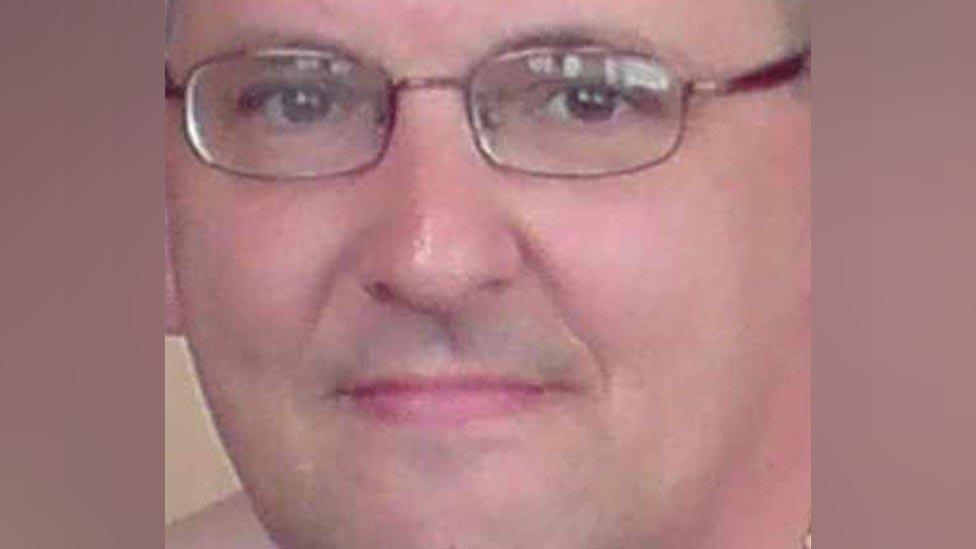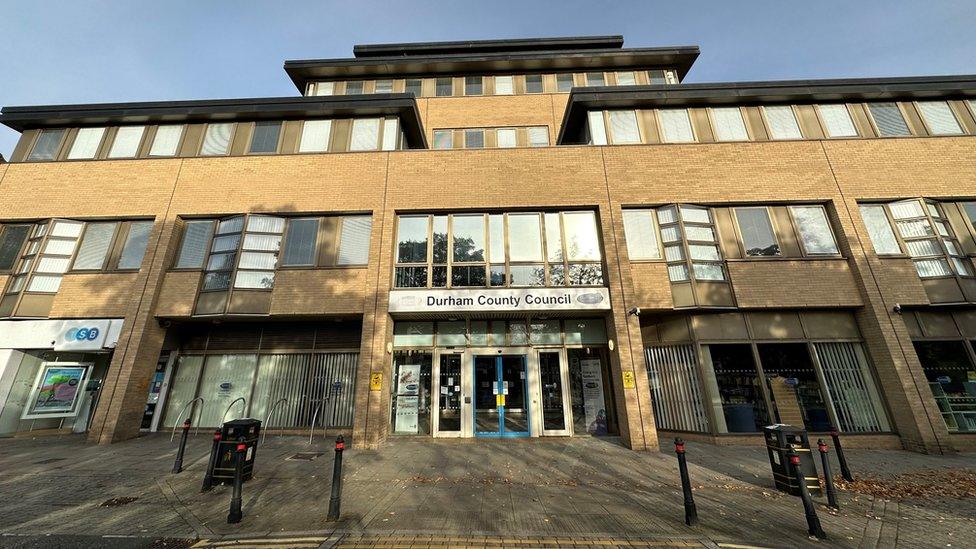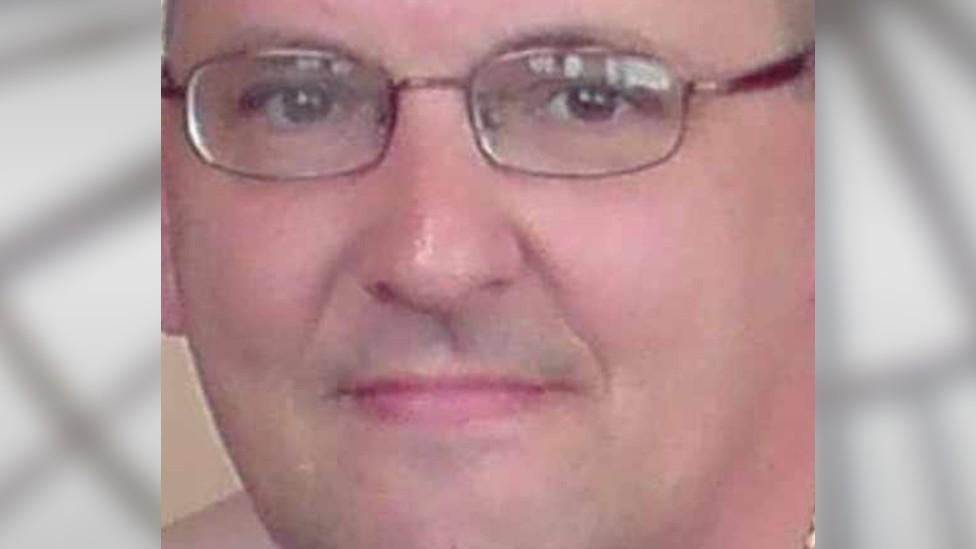David Stevens' death: Known NHS failures may have contributed
- Published

David Stevens was being treated by the Tees, Esk and Wear Valley NHS Trust when he died
Known failures at a mental health trust revealed in four deaths may have played a part in a man's suicide months later, an inquest has heard.
David Stevens, 57, was found dead at his home on 15 June 2022 while waiting for full treatment from the Tees, Esk and Wear Valley Trust to begin.
He had been deemed low-risk but a review found multiple issues, assistant coroner Janine Richards heard.
She said she would consider "missed opportunities" in his treatment.
Mr Stevens, a taxi driver from Willington, had been diagnosed with dysthymia - a long-lasting depression - and a paranoid personality disorder.
He reported hearing voices and having extreme anxiety.
Understaffed team
He was referred to the trust's access team, which supports people deemed to be at low-risk of self harm or suicide, on 25 January.
While he had assessments over the phone and in person, his first proper therapy session was not scheduled until 21 June.
Between May and June he made 15 calls to the trust's County Durham and Darlington crisis team - which was in special measures and chronically understaffed at the time - expressing anxieties he had with "internet scammers" and social media, a major lack of sleep and the medications he had been prescribed by his GP.
You can find information and support on the BBC's Action Line
He also attended A&E at University Hospital of North Durham three times; twice because he had sleeping problems and suicidal thoughts and again on 13 June after taking an overdose.

Who was David Stevens?
The inquest heard that Mr Stevens was the eldest of four children. He was born in Germany where his father served in the army.
They moved back to the UK when he was two.
He married in around 1989 and had three children, but following a divorce he lost contact with them. He was sad about this with Father's Day being particularly upsetting for him, the inquest heard.
He worked providing passenger assistance for a taxi firm, transporting children with disabilities to school, which he enjoyed.
He was a big Newcastle United fan and "loved" buses. He had a collection of model buses, his sister Keely Card said.
She said he was a "familiar face" in Willington and "would do anything for anyone".
He had a long history of depression but would get the bus to Durham for a walk along the river to clear his head.
Mrs Card said he seemed to get worse in January 2022, reducing the number of calls he made to his mother and the amount he posted on Facebook.
She said he was "massively let down by the mental health team" and it was "very distressing" that he was "not listened to when he sought help".
She said his "needless and untimely death could have been avoided".

Lynn Lewendon, a nurse with the North of England Commissioning Support, carried out a serious incident review to look at his "touchpoints" with the trust before his death.
She told the inquest in Crook she identified multiple issues in his care, including:
The access team planning his treatment not being made aware of his multiple calls to the crisis team, police and Samaritans which included expression of suicidal thoughts
Silo working and a lack of joined-up thinking
A misdiagnosis in an early assessment when he was said to have paranoid personality traits rather than a disorder which he had been diagnosed with in 2012
He repeatedly expressed concerns over his medication, but no review was arranged and he was instead told to speak to his GP
A false sense of security as his GP was prescribing him medication, but the GP was not told of the multiple medication issues Mr Stevens reported to the crisis team
After one call his treatment should have been escalated from low-level psychological intervention to a more intensive plan
The crisis team was in special measures and under pressure, with staff not having time to update the records fully
Unregistered and unqualified staff were answering crisis team calls
No rationale was provided for why he was originally assessed to not be in psychosis
A triage tool used to determine the risk someone posed was repeatedly not used by the crisis team
He repeatedly said he was struggling to sleep but was not offered sleep hygiene or relaxation techniques which might have helped him
No recognition he had been prescribed an anti-depressant he had previously had a "sensitivity to"
Ms Lewendon said had he survived until his appointment on 21 June, he would have waited 21 weeks since being referred for "active" treatment to begin.
The access team previously told the inquest it considered his treatment had started at the assessment stage when he was given preliminary techniques for managing his anxiety.

The inquest is being held at Crook coroner's court
Ms Lewendon said starting full treatment with cognitive behavioural therapy and techniques to break cycles of negative thinking and rumination may have made a difference in his case.
"He was clearly anxious and unable to sleep," she said, adding: "He may have been able to manage his anxiety if he had accessed treatment sooner."
Ms Lewendon also said no-one took a "helicopter view" of his multiple calls to the trust's teams, which should have led to his care plan and risk being re-assessed.
Staff 'firefighting'
The coroner also heard a thematic review was carried out by the trust in November 2021, seven months before Mr Stevens' death, following the deaths of four patients who had contact with the crisis team.
That also found a number of failings, some of which Ms Lewendon said could still have been a factor in Mr Stevens' death.
These included:
The crisis team being under so-called "business continuity plans", meaning it was in special measures, with workers only "firefighting"
A systemic underuse of the triage tool
An under-estimation on patient risk assessment and safety plans and inappropriate discharge to the access team
Potential psychosis not being identified and people being inappropriately referred to the access team
A lack of awareness of the role and function of the crisis team
A lack of liaison with other agencies and sharing of information between services and a failure to inform GPs of patients' contacts with the crisis team
Trust nursing director Sharon Salvin told the inquest the service was now "significantly better", with the crisis team leaving special measures in June 2023.
She said there had been a backlog of cases with up to 80 patients awaiting allocation at one time, which was now down to 10.
She said there was "extreme pressure" on the trust at the time and, while there was still a high demand, the trust had made multiple changes to meet them.
Ms Salvin said Mr Stevens' case was now used in staff training so they understood the "potential consequence of not looking at the big picture".
The inquest continues.

Follow BBC North East & Cumbria on X (formerly Twitter), external, Facebook, external and Instagram, external. Send your story ideas to northeastandcumbria@bbc.co.uk, external.
Related topics
- Published16 October 2023
